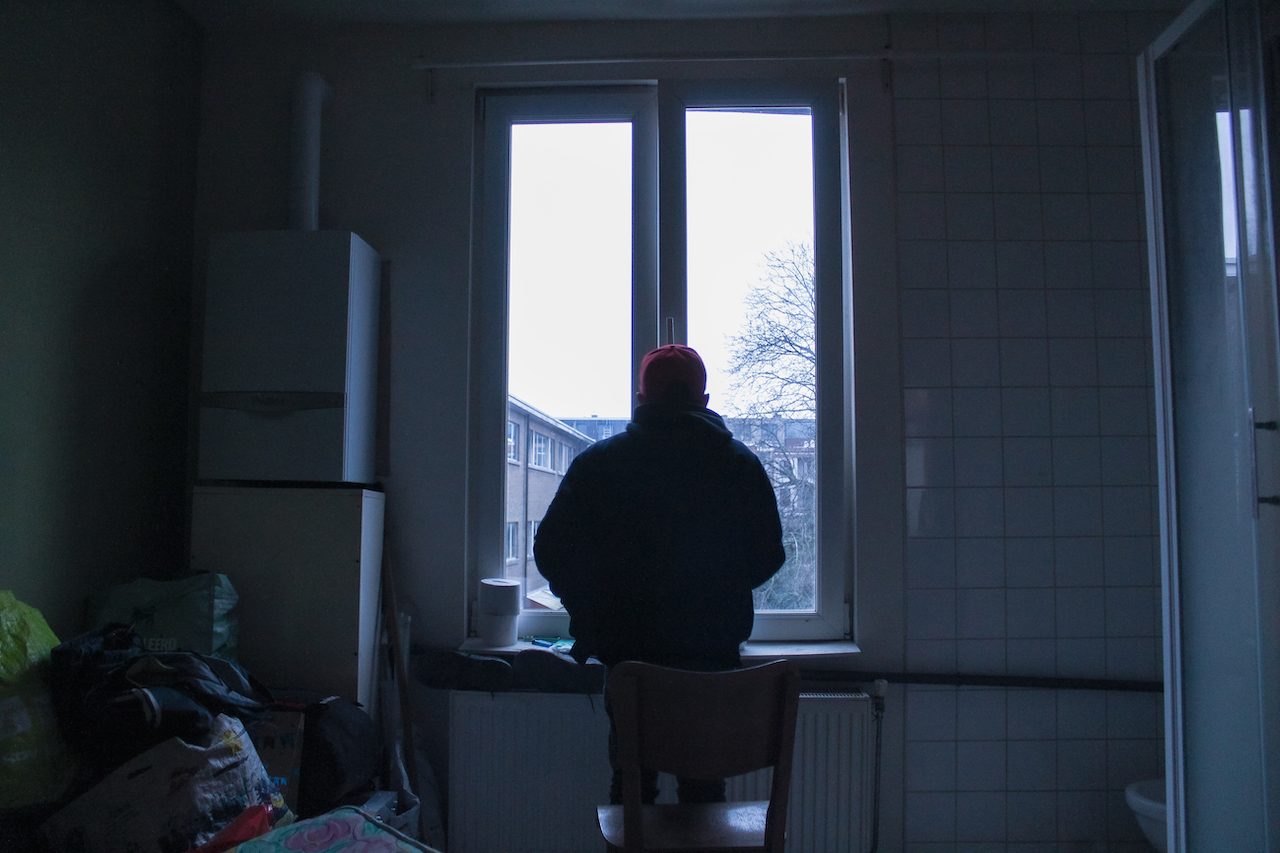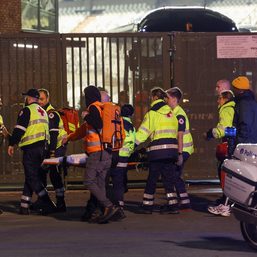SUMMARY
This is AI generated summarization, which may have errors. For context, always refer to the full article.

Additional reporting from Muhammad Owasim Uddin Bhuyan and Goele Vandenberghe
This investigation was supported by Journalismfund Europe’s Modern Slavery Unveiled grant programme.
*Names of the workers have been changed to protect their identities
ANTWERP, Belgium – In July 2022, Belgian police discovered 174 illegally employed workers at a factory owned by Borealis, an Austrian multinational and chemical manufacturer. Most of the workers were Turkish and Bangladeshi, 65 were Filipino. They arrived to work at the port of Antwerp between February and May 2022.
Employed as pipe fitters and crane operators, the Filipinos were severely underpaid, earning €8.50 (P512) an hour, about three times less than the standard of around €24 (P1,443) an hour.
Borealis is a big player in the European market for base chemicals and fertilizers. The company denies any wrongdoing and blames the Italian manpower agency and subcontractor IREM group. When news of the trafficked workers emerged, Borealis suspended then terminated relations with IREM.
Previously employed in Eastern Europe, the Filipinos were recruited to work in Belgium by IREM and another subcontractor, Raj Bhar Engineering. They’d been promised proper minimum wages and all the necessary permits.
They learned that they’d been deceived only when police and immigration officials arrived to accost them and temporarily halt the plant’s operations.
A Belgian public prosecutor, appointed by the state per region, is currently investigating the case to determine if the Filipinos were indeed trafficked.
Meanwhile, the Belgian state has granted each of the workers an “Orange Card,” a type of residency permit valid for three to six months. Periodically, they have to renew their residency for as long as their case is under inquiry.
If the prosecutor decides against the Filipinos, they will all be sent back to the Philippines.
Very little attention has been paid to the Filipinos at the heart of Belgium’s biggest-ever trafficking scandal. The workers, owed months of back-pay for the legally-mandated wages of around €8500 (P517,556), are at risk of being forgotten and could go home with nothing.
Nearly a year since their rescue, the Filipino workers live in uncertain and precarious conditions, a plight that their homeland is apparently not aware of.
Flemish destination
In January, trudging against unfamiliar winter chills, the Filipino workers shuffled into a packed tram across Antwerp Central station. The passengers, the city’s workforce, filled the vehicle with the conversation of what seemed like a dozen languages: Filipino, Turkish, Arabic, Chinese, Korean, Bahasa Indonesia, among others. Nobody uttered a word of Dutch or French – Belgium’s main languages.

They were headed to night classes about integrating into Belgian society at a nearby state-sponsored learning institute, a requirement of their now-temporary residence.
Happy to be reunited after working shifts at various warehouses and construction sites, they crowded at a street corner as they waited for the others before proceeding to class. They smoked cigarettes to stave off the cold of evening winds and huddled to swap stories.
“Working student na tayo,” joked Peter* as the workers entered a local kebab shop. The likable Visayan crane operator often treated his workmates to after-class meals.
“I don’t have a wife and kids like them, just siblings to support anyway,” he said, before jumping in line to order dinner for a dozen people.
All of them are beginning to learn about Belgian society, their rights as residents and the labor standards that treat them as equals of the domestic labor force.
At the plant, nobody questioned the working conditions. They quietly went along with earning way below the standard because it was also the biggest paycheck they’d ever had.
Livable employment opportunities are scarce in the Philippines. By the end of 2022, the Social Weather Stations surveys revealed that 21.6% of Filipinos were jobless.
Despite being underpaid, the Borealis workers earned 620% more than what they would have gotten in Metro Manila.
Foreign and local workers in Belgium have the same rights. The lowest pay in Belgium is €11 (P670) an hour, 29% higher than what the Filipinos received. Pipe fitters and crane operators usually make €18 (P1,096) up to €24 (P1,443) an hour.
Undocumented labor in the port area has been growing for quite some time now, according to Belgian Workers Party (PVDA) regional leader Ward Coenegrachts. Smaller cases of labor trafficking have been discovered all over the city in recent years, he told Rappler.
Coenegrachts estimated that among the workforce handled by labor subcontractors “not even 5% are Belgian. They’ve come from all over the world then handed bad or fake contracts. Tens of thousands of people are in very bad working conditions all over Antwerp and you never hear about them.”
The Borealis case didn’t set a precedent. It was a tipping point, revealing the sheer scale of problems in the labor market.
Antwerp, Belgium’s second largest city, is fast becoming one of the biggest multicultural urban centers in the world with over half a million people divided into 174 nationalities. The port area is a hub for industrial powerhouses, with labor in high demand.

Myria, an organization appointed by the government to act as independent national rapporteur on trafficking, has documented the influx of labor entering Antwerp. They noted significant growth in the employment of non-EU nationals, from 9% in 2017 to 27% by the end of 2021.
Alexandra Buchler, the group’s migration expert, estimates that the city could now have around 150,000 undocumented workers, over a fifth of the population.
To complete the projects at the port area, Payoke, an NGO tasked by the state to shelter trafficked workers in Flanders, believes around 10,000 more migrant workers will be needed.
According to the Philippine embassy in Belgium, there are 18,000 individuals born in the Philippines and now legally staying in Belgium. Most are employed as domestic helpers or in the service industry where they earn €16 (P977) an hour on average.
Up until the Borealis case, Myria said that Filipinos were rarely seen in the construction industry, which the group has labeled a “risk sector” for labor violations.
The Borealis case “exposed the limits of the Belgian system” to handle the gravity of people involved, said Buchler.
‘Jumping’ into Belgium
Before coming to Belgium, the workers were employed legally in either Poland or Hungary in 2021.
The soft-spoken Batangas native Henry* kept his hands inside his front pockets for warmth while sharing his story about entry into Belgium. He still wore the thin jacket provided by his bosses in Poland. He had barely enough to afford the necessary layers to cope with the Belgian winter when he met up with Rappler in February.
When asked who his previous employers were, he pointed to the printed logo on the jacket – it said Daeshin Construction plant, a Korean machinery manufacturer.
A mere US$2.7 (P149) an hour on 10-hour shifts was not the income he hoped for, especially after paying an P80,000 placement fee to recruitment agency VFG International. He needed to put two kids through school and support his extended family in Batangas.
When he learned of recruiters looking for new hands with triple their salary at the time, Henry recalled, “We were convinced we had to jump. If we knew it was illegal, we wouldn’t have.”
The workers alleged that a network of manpower agencies and subcontractors recruited cheap labor from Eastern Europe into Western Europe.
Many of the workers were recruited through Raj Bhar Engineering, which has offices in Bangladesh, Portugal, and Croatia. On its website, the company lists IREM SPA and two other IREM group subsidiaries as partners.
The Filipino and Bangladeshi workers point to the IREM group as the main culprit. It provided the contracts, paid the substandard wages, and promised the work permits that never arrived.
Peter, the Filipino crane operator, had worked with IREM before in three other countries, developing a level of mutual trust with its personnel. He had a natural charm and was well-liked. Besides his habit of treating his co-workers to meals, he handed out cigarettes during breaks to his supervisors.
In hindsight, he said, maybe it was his rapport with the staff that blinded him to irregularities earlier.
Attending the Sunday service at Antwerp’s Church of Saint Boniface, Peter led several workers in a sort of confession: he should have noticed something was awry before he reached Belgium.
IREM arranged for Peter’s ticket on a tourist visa to Eindhoven in the Netherlands, close to the Belgian border. When Dutch immigration asked if he had any intention to work there, he answered, “No, I am just passing through,” repeating what IREM told him to say. Technically, he wasn’t lying.
An IREM employee picked him up at the airport and drove him straight to Antwerp. Peter said they have a vast network of recruiters who can get bonuses of about €100 for each worker they can get on site.
He likened the network of agencies to a family tree.
“IREM is the mother, then Raj Bhar and the others, they’re like nieces and nephews. But IREM is the one dictating their moves,” he said.
The day the police came Peter said the “company tried to hide me. They like me, they didn’t want me to get caught.”
Days before, he recalled seeing IREM staff pacing and arguing onsite, looking worried. They badgered him to marry a Belgian immediately so that he could stay.
Among the workers, outspoken Batangas-born Ricky* is regarded by his peers as a leader.
Hours following the raid at the plant, IREM tried to convince him and many others to cross another border into Greece and work at another plant. They were shown flight tickets to leave that very evening.
“Kuha na namin diskarte nila: ibang planta, wala pa ring papel. Sabi namin ayaw na namin. Alanganin na,” said Ricky, wincing. (We understood their methods already: different plant, still no papers. We rejected the offer. Too much uncertainty.)
First responders
For the next three months after the raid, the workers were jobless, then hungry. They relied on donations from the Filipino community that rationed supplies regularly.
Ador Olavare of the Belgium chapter of Migrante, a grassroots organization for migrant welfare, described the post-rescue period as “troubling,” because of the constant need to gather resources for dozens of people.
“Worse, they had nothing to send to their families,” he added.
Jon Aguila is the chairperson of the Ugnayan ng Pilipino sa Belgium (Association of Filipinos in Belgium) or UPB. He got a call last year from the Philippine embassy in Belgium asking him to mobilize the Filipino community to feed the rescued workers. It would take weeks before Philippine officials were able to afford any material support.
“They said they were still requesting funding from Manila. We’re here to help. But our officials must also be prepared,” Aguila said.
The workers were scattered, staying and crowding inside the homes of other Filipinos or friends of UPB and other concerned groups and individuals across Belgium. Some had to sleep in tents put up in backyards, while the entire Filipino community in the country scrambled for donations.
The embassy had requested for the $5,000 (P276,745) Assistance to Nationals Fund (ATN) from the Philippine government.
“We’d rather give in-kind, food and everything. Every week, we’d give them until the fund ran out,” said Consul General Pablito Mendoza.
Mendoza disclosed that should a similar crisis happen again, they could lose direct access to the ATN as it will come under the discretion of the newly-formed Department of Migrant Workers (DMW) in the Philippines.
Apart from the ATN, DMW Secretary Susan Ople arrived as part of President Ferdinand Marcos Jr.’s entourage last December and she distributed cash assistance. Alongside the embassy, Ople handed out €195 (P11,873) for 26 of the Borealis workers.
They left out the 39 because “they told us that those with jobs wouldn’t receive ayuda (assistance),” said Ricky.
It was only through persistent appeals that the rest of the workers received their share of emergency assistance. It was released in early February, seven months after the rescue.
“Too little, too late. They’ve already been through so much,” Olavare said.
Migrante called on the Marcos administration to up its vigilance on human trafficking and recognition of the workers’ troubles.
“Our government should look at the recruiting agencies and review their track records to spare our kababayan (fellow Filipinos),” said Olavare.
One after another
According to Payoke, 25 Filipino workers are living in apartments arranged by new employers. Meanwhile, 33 are still without a job, as of March 2023.
Ricky shares a modest studio apartment with another worker in the outskirts of Antwerp.

On many nights, he receives calls from other Filipinos, new arrivals in Belgium from Eastern Europe. “Anong gagawin namin, wala pala kaming mga papel. (What will we do, we thought we had the right papers),” said one worker over the phone, crying in desperation.
Braving hunger and fear, some of them escaped from abusive employers, others arrived under false pretenses. Ricky tells them to stay calm, consider going home, or tell the authorities exactly what happened.
A month after the Borealis scandal, on August 17, 2022, police discovered 58 Filipino workers illegally employed by German chemical producer BASF at Antwerp port. Nine of the BASF workers had come from the Borealis factory. All of them were previously working in Eastern Europe.
Olavare noted that more and more workers from developing nations are coming into the continent via Eastern countries then transferring west for better pay.
“It’s difficult to enter Belgium so they come through eastern countries. The Philippines should do a better job scrutinizing the agencies involved,” he said.
Payoke director Anton Van Dyck told Rappler that they normally handle about four trafficking cases a month. Following the Borealis incident, “it became closer to a hundred.”
Their offices were swamped and their operations have been periodically crippled. Payoke needed to double the number of staff in a matter of weeks to care for the unexpected number of trafficked workers in the Flemish region. By their own estimates, they’ve gone €300,000 (P18.2 million) over budget.
“We can’t do it again,” admitted Van Dyck, “should another case arise in the near future.” (To be concluded) – Rappler.com
NEXT: Part 2 | Forgotten Filipinos struggle to remain in Belgium
Add a comment
How does this make you feel?










There are no comments yet. Add your comment to start the conversation.